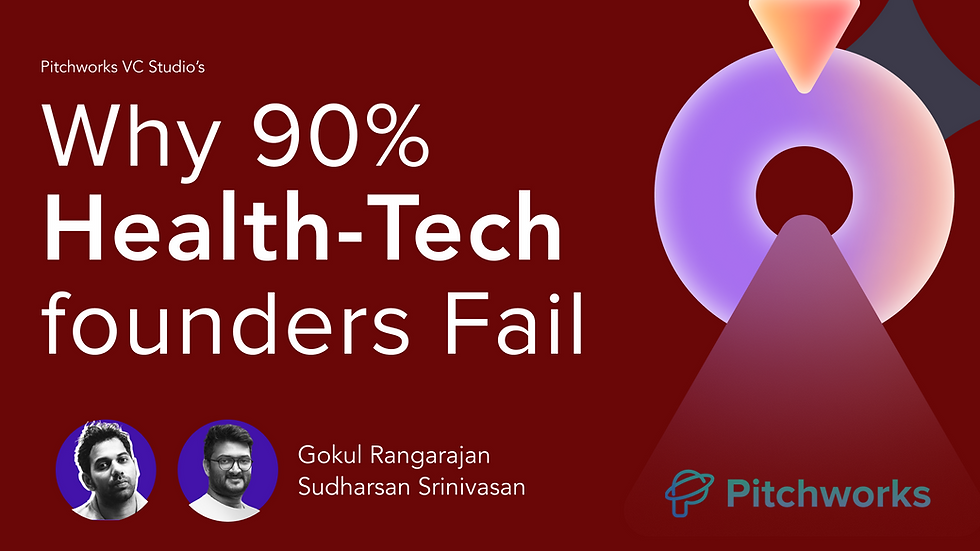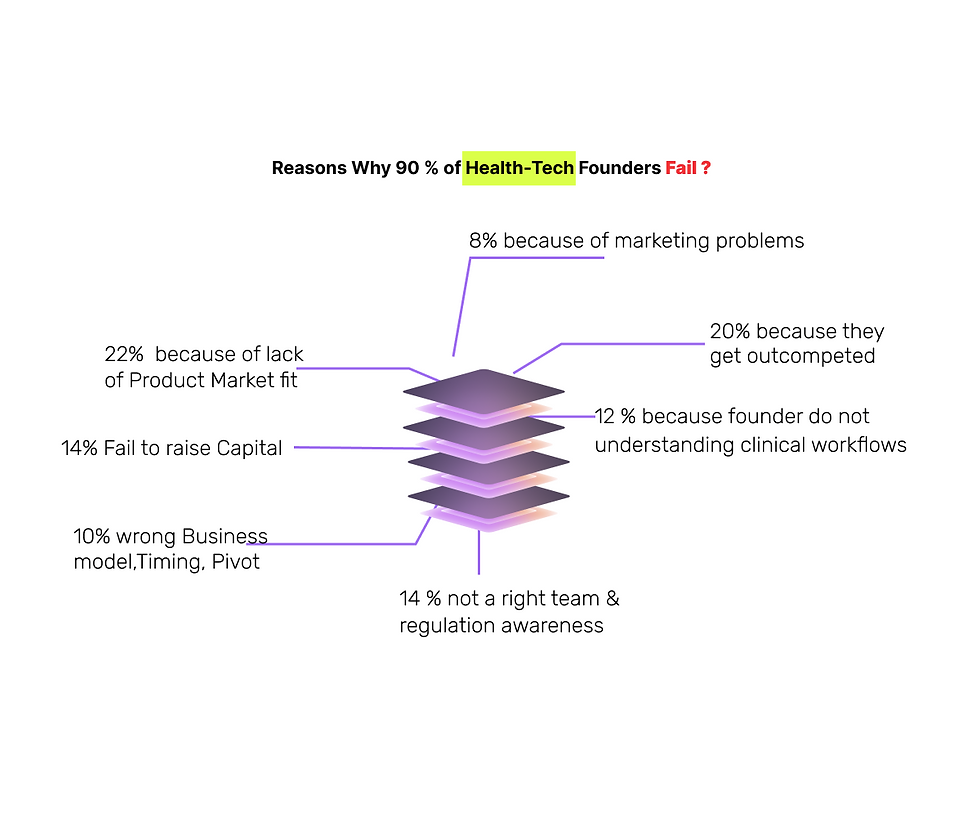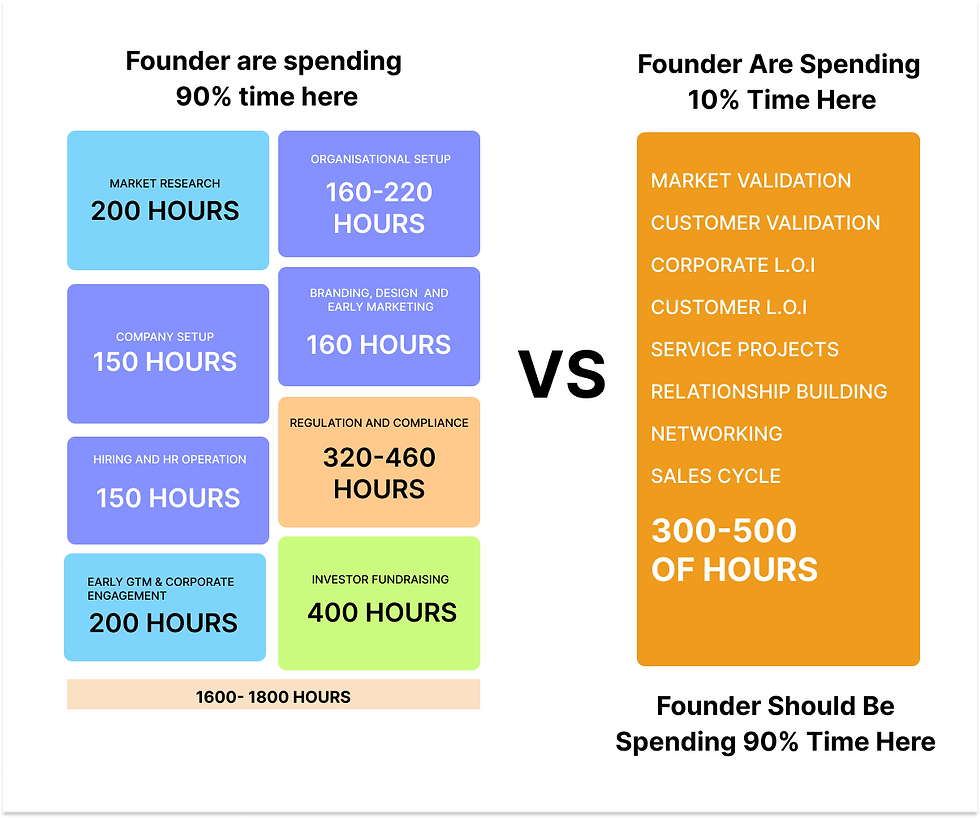Decoding Health Tech Write-offs: Reasons Why 90% of Early stage Healthcare Technology Startup Founders Fail
- Gokul Rangarajan
- Jun 24, 2024
- 9 min read
Explore the critical factors behind the high failure rate among health tech founders. Gain insights into common pitfalls, strategic missteps, and essential lessons to avoid, ensuring your startup's path to success in the competitive healthcare technology landscape.

The number of healthcare companies founded in India peaked in 2020 and has been falling ever since, though we had witnessed an explosion of startups promising innovative solutions to revolutionize patient care, improve accessibility, and reduce costs. However, amid the buzz and excitement, many of these ventures have failed to achieve their intended goals. It's ironic that in a field focused on improving health, many startups seem to suffer from chronic ailments of their own.
A critical analysis of 1900 + Startups reveals several common mistakes that can serve as valuable lessons for entrepreneurs and investors alike. For example, a whopping 90% of health-tech startups fail,"Health-Tech seem to be damn hard place to do business says" my analyst after he spent 200 hours on just investigating the entire set of Health-Tech startups both successful and Failed ones in the last 15 years.

We found top reason for success and failure is the same
"Quality of Founder"
But digging deeper reasons Why 90 % of Health-Tech Founders Fail ?
22% Lack of Product-Market Fit (the most common pitfall) :
Explanation: This occurs when startups develop a product that does not adequately meet the needs of the market or solve a significant problem for their target audience. It's akin to creating a sophisticated medical device that no healthcare provider finds necessary or useful. Many health-tech startups rush to market with an innovative solution without thoroughly validating the demand. The enthusiasm for tech advancements sometimes overshadows the practical requirements of the healthcare industry.
This can be Solved by just proper market research and validation, or founder having 10,000 hours + working in the industry,
20% Outcompeted due to inadequate market research 📉
Startups that fail to conduct comprehensive market research often find themselves outpaced by competitors who better understand the market dynamics and customer needs. This can lead to developing products that are quickly overshadowed by superior alternatives.
This can again be solved by just proper market research and validation, or founder having 10,000 hours + working in the industry,
14% Struggle to Raise Capital Missing out on vital funding 💸 Securing adequate funding is crucial for the development and scaling of health-tech innovations. Startups often fail to present compelling business cases to investors or lack the necessary networks to attract investment. Less than 5% of the Health tech startups live get funded. Having an in house Investment Relationship manager or having a co-founder CFO who can handle end to end fundraising or having a co founder coming from VC background could help in speeding the process.
12% Misunderstanding Clinical Workflows, a critical oversight 🏥 Health-tech startups must integrate seamlessly with existing clinical workflows to be adopted by healthcare providers. A lack of understanding in this area can result in products that are impractical or cumbersome for end-users. A health-tech solution that requires significant changes in daily routines of healthcare professionals is likely to face resistance, regardless of its potential benefits. Market Research Problem , not having understanding of Healthcare systems, competition.
10% Wrong Business Model, Timing, or Pivot, a costly mistake ⏳
Selecting the wrong business model or mistiming the market entry can doom a startup. Similarly, failing to pivot when necessary can lock a startup into a path that leads to failure. Market intelligence Problem
14% Lack the Right Team & Regulatory Insight, hindering operational success: Building a team with the right expertise and understanding regulatory requirements is critical. Startups lacking in these areas can struggle with operational challenges and compliance issues. A health-tech startup that does not include regulatory experts might face significant delays or penalties, affecting its ability to launch and operate effectively. Market Research Problem If you see at least 30-40% of idea, money and time could have been saved if done proper market research , continuous market intelligence and building Relationship with customers who is gonna pay you. This is true for both B2B and B2C Health Tech startups. Is this because founders if single founder it even worse as there are asked to wear multiple hats.

Early-stage founders are often expected to wear multiple hats, juggling various responsibilities simultaneously. These include hiring and retaining talent, networking, managing partnerships, driving product adoption, building and maintaining a cohesive team, and ensuring customer support and success. They also need to focus on branding, resolving co-founder conflicts, adhering to regulations, managing technical debt, maintaining investor relations, driving sales, ensuring quality assurance, and developing the product. Additionally, founders are tasked with fostering employee emotional intelligence, optimizing costs, raising funds, conducting training, handling payroll, and much more.
This multitude of responsibilities can quickly become overwhelming, even for the most dedicated and capable founders. Balancing these diverse tasks requires immense effort, resilience, and strategic time management. The constant pressure to excel in every aspect can lead to burnout and affect overall productivity. It's crucial for founders to recognize the limits of their capacity and seek support, whether through hiring key personnel, leveraging mentors, or forming strategic partnerships, to share the load and ensure sustainable growth and success for their startups.

Activity | Percentage of Time | Hours per Week | Total Hours (26 Weeks) |
Regulation and Compliance | 15-20% | 9-12 | 234-312 |
Company Setup | 5-10% | 3-6 | 78-156 |
Fundraising | 10-15% | 6-9 | 156-234 |
Hiring | 10-15% | 6-9 | 156-234 |
Legal | 5-10% | 3-6 | 78-156 |
Other Work (Operations, Product Development, Networking, etc.) | 15-20% | 9-12 | 234-312 |
Market Validation | 15-20% | 9-12 | 234-312 |
Market Research | 10-15% | 6-9 | 156-234 |
Founders should be dedicating 90% of their time to market validation and market research. These activities are crucial for understanding customer needs, testing product viability, and refining the business model. By focusing on these areas, founders can ensure their startup is built on a solid foundation of real customer demand and preferences.
However, necessary but time-consuming tasks such as regulation and compliance, company setup, fundraising, hiring, legal work, and other responsibilities (like operations, product development, and networking) are currently occupying 90% of their time. To effectively balance these demands, founders should consider strategies like outsourcing, automation, delegation, and efficient planning to free up more time for market validation and research.
Navigating the complex legal frameworks in the healthcare industry is a critical challenge for health-tech startups. Ensuring compliance with privacy, security, and data protection regulations such as HIPAA in the United States or GDPR in Europe is essential from the very beginning. These regulations are designed to protect patient data and maintain confidentiality, and failing to adhere to them can result in severe consequences. Health-tech startups must allocate resources to understand and implement these regulations properly, often requiring specialized legal counsel and robust internal policies to mitigate risks.
Neglecting these crucial aspects can lead to significant setbacks, including loss of customer trust, reputational damage, and potentially severe legal ramifications. Non-compliance can result in hefty fines, legal battles, and even the shutdown of the startup. Beyond legal issues, a breach of data security can irreparably harm a company's relationship with its users. Therefore, prioritizing regulatory compliance and data protection not only safeguards the startup from legal troubles but also builds a foundation of trust and credibility with its stakeholders, which is vital for long-term success. What are the after effects of Startup failure ?

The journey of first-time health-tech founders is fraught with challenges, with only 18% ultimately achieving success. This statistic highlights the formidable obstacles unique to the health-tech industry. Founders must navigate a labyrinth of regulatory requirements, ensuring compliance with stringent privacy, security, and data protection laws. Additionally, they face the challenge of market validation in a highly specialized and often conservative sector. Securing funding is another significant hurdle, as investors are typically cautious of the lengthy and uncertain timelines associated with health-tech innovations. Building a competent team with both technological expertise and industry-specific knowledge is crucial yet difficult. These factors combined create a high barrier to success, underscoring the importance of meticulous planning, resilience, and adaptability for first-time health-tech entrepreneurs.
The demanding nature of founding a startup takes a substantial toll on mental health, with 72% of founders reporting struggles in this area. The pressure to succeed in a competitive landscape, coupled with the constant uncertainty and high stakes, leads to a significant mental health burden. Specifically, 37% of founders suffer from anxiety, often stemming from the relentless demands and pressures of running a business. Additionally, 36% experience burnout, a result of prolonged stress and overwork that leaves them feeling exhausted and disengaged. Even more concerning, 10% of founders have experienced panic attacks, which are intense episodes of fear and physical discomfort that can be debilitating. These statistics underscore the critical need for mental health support and self-care strategies among entrepreneurs to ensure they can sustain their efforts and lead effectively.
After experiencing a startup failure, 45% of founders choose not to embark on another entrepreneurial venture, particularly if their initial attempt was not perceived as successful. This statistic underscores the profound impact of failure on entrepreneurs' confidence and willingness to take risks again in the competitive startup landscape. For those who do persist, the road to recovery is often arduous, with 20% of founders taking up to 18 months to overcome the mental and emotional toll associated with their failed venture. Mental health issues such as anxiety, depression, and burnout are prevalent among entrepreneurs post-failure, stemming from the immense pressure, uncertainty, and financial strain inherent in startup endeavors. This prolonged recovery period highlights the importance of resilience, mental health support, and a supportive ecosystem that encourages founders to learn from setbacks and pursue new opportunities despite past challenges.
Impact on Eco-System

The broken patient experience of enduring a six-week wait due to discontinued health services exacerbates anxiety and stress among patients and buyers. This delay not only impacts their immediate healthcare needs but also underscores broader systemic challenges in the healthcare industry. According to recent studies, 67% of patients express frustration with long wait times for essential medical services, leading to heightened levels of anxiety. Moreover, 42% of individuals report feeling abandoned or neglected when healthcare providers discontinue services abruptly, exacerbating feelings of uncertainty and helplessness. This prolonged wait can also lead to worsening health conditions and increased reliance on emergency care, further straining both patients and the healthcare system. Addressing these issues requires proactive communication, streamlined transitions of care, and robust patient support systems to mitigate the adverse effects of service disruptions on patient well-being.
The increasing frequency of job turnover, with employees changing jobs every 1-2 years, is contributing to an uncertain economic workforce and disrupting traditional talent systems. This trend challenges the stability of career paths and organizational continuity, as frequent turnover can lead to gaps in institutional knowledge and hinder long-term strategic planning. Moreover, the rapid turnover disrupts traditional talent management practices, making it difficult for companies to nurture and retain skilled professionals who contribute to sustained organizational growth. The evolving economic landscape and shifting attitudes towards job security and career advancement underscore the need for innovative approaches in talent acquisition, development, and retention strategies. Companies must adapt by fostering a culture of continuous learning, providing meaningful career progression opportunities, and offering competitive compensation and benefits to attract and retain top talent in an increasingly transient job market.
Seventy-five percent of venture-backed health tech startups fail to achieve a return on investment for their investors, highlighting the high-risk nature of the industry. Among these, 35% result in a total loss of investment, amounting to a staggering $3 billion lost over the past decade alone. This statistic underscores the challenges inherent in launching and sustaining innovative health tech ventures, where factors such as regulatory hurdles, market adoption rates, and technological complexities contribute to the high failure rate. For investors, these losses underscore the importance of rigorous due diligence, strategic portfolio diversification, and ongoing evaluation of market trends and startup performance. Despite these challenges, successful health tech startups that navigate these obstacles can drive significant advancements in healthcare delivery, patient outcomes, and industry innovation.
This financial strain deters future investments in innovative healthcare ventures, slowing down the development and adoption of potentially transformative technologies. As established players may feel less pressure to innovate amidst this landscape, there's a heightened risk of complacency that could ultimately hinder advancements in patient care and operational efficiencies across the healthcare ecosystem.
The Right question to ask ourselves is How Can we reduce the risk on Health Tech startup investment ? and empower the founders vision to succeed in the most common average case possible ? as well as Make Sustaining Talent in the most economical and most affordable way.
There are few right systems currently
Outsourcing: Hire external experts or firms to handle regulation, compliance, legal work, and even some aspects of fundraising and hiring.
Automation: Use software tools to automate routine tasks, especially in operations and hiring.
Delegation: Delegate responsibilities to trusted team members or co-founders who can handle specific areas effectively.
Efficient Planning: Prioritize tasks and set clear goals to manage time more effectively.
Leveraging Networks: Use professional networks for advice and support in areas like legal, compliance, and fundraising to avoid reinventing the wheel.
Pitchworks VC Studio program offers 9 months program which offers Affordable Startup governance, Capital Infusion with Market research and Market validation, where we take care of the the entire necessary operation partner with you long term as co founder or venture capital partnership

Pitchworks VC Studio Co-pilot Sprints is a 9 months program offering

Pitchworks VC Studio's Co-pilot Sprints is a comprehensive 9-month program designed to streamline startup operations. By integrating regulation execution, fundraising support, technology development, customer validation, operational execution, and administrative tasks, the program aims to put founders in an autopilot mode. This approach allows entrepreneurs to focus more on strategic growth, market validation, and refining their product or service, leveraging Pitchworks' structured support to navigate crucial business functions effectively throughout their journey.

Comments